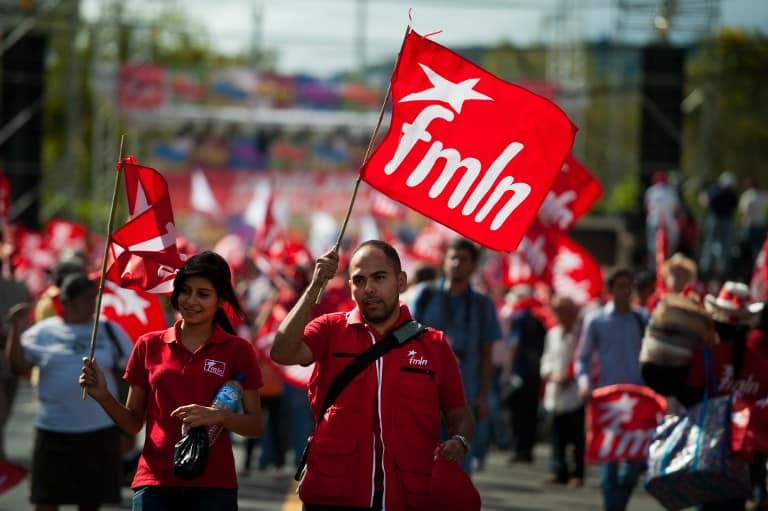The rise of the left in Latin America could see reinforcement with a triumph by the Broad Front Party (FA) that would be historic in Costa Rica, and the re-election of the ex-guerrilla Farabundo Martí National Liberation Front in El Salvador in simultaneous elections on Sunday.
A polarization of “left versus right,” unprecedented in Costa Rica and repeating itself in El Salvador, has converged in the two elections. Both elections are too close to call and likely will result in runoffs, according to polls.
“They have in common the day the elections will take place, and campaigns of ‘fear,’” Roberto Cañas, a political and economic analyst in San Salvador, said. “But there are two lefts, two histories, two countries, two very different candidates.”
In Costa Rica, the young lawmaker and environmentalist José María Villalta, 36, of the Broad Front Party, is among the favorites, along with former San José mayor Johnny Araya, 56, from the governing National Liberation Party.
“The support of FA is multi-ideological: Villalta channels the discontent, the protest votes, not only against the political system, but also the economic system. That’s where this strong surge from the left originates in Costa Rica,” Jaime Ordóñez, director of the Central American Institute on Governability, said.
In El Salvador, the candidate of the governing FMLN, current Vice President Salvador Sánchez Cerén, 69, leads the polls ahead of former capital city mayor Norman Quijano, 67, of the rightist Nationalist Republican Alliance (ARENA).
Unlike 2009, when the moderate candidate Mauricio Funes, a former journalist, helped El Salvador’s left win the presidency for the first time in the country’s history, the FMLN has bet on an outsider and ex-guerrilla commander to curb the right’s attempt to regain power.
In the Costa Rican elections, the situation is more unpredictable: Two other candidates, one from the right – Otto Guevara – and one from the center-left – Luis Guillermo Solís – follow close behind Araya and Villalta.
“If (in Costa Rica) there were only two sides, as in El Salvador, it would be much easier to predict, said Costa Rican political analyst Víctor Ramírez. “The reality is that in Costa Rica there is an atomization.”
If no candidate wins a minimum of 50 percent of the vote in El Salvador and 40 percent in Costa Rica, the contests will be decided in runoffs on March 9 and April 4, respectively.
Although the two countries’ political philosophies are different, a triumph of the left in Costa Rica and El Salvador would reinforce a trend in Latin America that has yet to dominate in Central America, which has conservative governments in Guatemala, Honduras and Panama.
“I don’t think the U.S. is thrilled,” Cañas said. “Neither are members of the Central American business elite, who have globalized their interests and access. They invest in political parties and expect payoffs later.”
Two economic models are at odds: the neoliberalism of ARENA and the PLN, and the more statist socialism of the FMLN and the FA that avoids stirring trouble with the U.S., the major trading partner of both countries. In the case of El Salvador, the U.S. is the source of remittances from migrants, who help bolster the country’s economy.
“I don’t believe anyone is seeking to deeply change the model,” Cañas said. “Neither the Cuban revolution nor Venezuelan chavismo are coming to these two countries.”
In an interview with the AFP, Villalta said, “Costa Rica has its own development tradition of a “Tico-style socialism,” although he said the left has been demonized during the campaign.
In Costa Rica, that polarization has brought out comparisons to Cuba, Venezuela or Nicaragua, which the FA has called a “campaign of fear.” For example, the Supreme Elections Tribunal reprimanded businesses that asked their employees not to vote for the “communist” candidate.
Villalta’s adversaries have lobbed labels of “communist,” “chavista,” and “friend of Ortega.”
“We do not believe that another country’s model can be copied,” Villalta said, adding that Costa Rica should learn from the successes and errors of Latin American leftists and follow its “own path.”
In El Salvador, which endured a civil war from 1980-1992, fear campaigning also was a tactic in 2009. But five years of moderate government from the FMLN have maintained a dollarized economy and prevented capital flight.
“They were saying that our children were going to be shipped to Cuba and our elderly would be made into soap,” Cañas said of El Salvador’s fear campaign in 2009. “They said that if we had two hens, one would be given to the state. That campaign didn’t work. We’ll see if it does in Costa Rica.”






